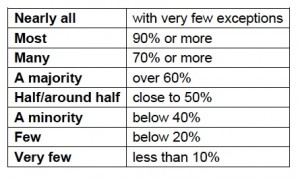At the end of January we received the sad news that our ITB and VETNET colleague Rainer Bremer had passed away after a difficult phase with severe illnesses. Three days ago he would have celebrated his 65th birthday, but now he is gone. It has taken some time to get my thoughts together on this fact. After all, I have known Rainer since 1993 when I was still working as a junior researcher in Finland and building contacts with ITB (Institut Technik & Bildung, University of Bremen). Shortly afterwards I changed to Cedefop (European Centre for the Development of Vocational Training) and in that contexts worked together with several EU-funded projects – and Rainer was involved in some of them. Then, from 2005 I have been working in ITB and Rainer has been one of veterans of ITB who continued all these years with national, European and international projects.
Below I try to bring together some memories of Rainer from different phases of our research careers. In particular I would like to focus on our encounters in project work and in the many ECER events (European Conference on Educational Research) in which Rainer was prominently present from the early years on.
Modellversuch Schwarze Pumpe and other similar pilot projects
I learned to know Rainer shortly after he had started in ITB and in the accompanying research team of the pilot project Schwarze Pumpe (wissenschaftliche Begleitung der Modellversuch Schwarze Pumpe). This pilot project focused on promoting dually oriented qualifications – acquisition of regular vocational qualification and university entrance qualification (Fachhochschulreife) – without extension of education and training time. Rainer was responsible for accompanying the school part of the pilot, Hans-Dieter Höpfner for the workplace part, and Gerald Heidegger for the management of the accompanying research altogether.
During my first years at Cedefop I had the pleasure to attend some of the interim events of this pilot. In particular I was impressed by the integrated projects that some teams of vocational school teachers and in-company trainers had planned together – involving apprentices from different trades. And I was pleased with the way that the accompanying researchers brought these pedagogic achievements forward. In particular this was the case with nation-wide conference of similar German pilot projects, coordinated by MV Schwarze Pumpe. It struck me that Rainer (from West-Germany) and Hans-Dieter (from East-Germany) could bring together pilot projects that highlighted best practice from West and East (relatively shortly after the German unification).
European projects on parity of esteem and dually oriented qualifications
In the first phase of the EU action programme for vocational education – Leonardo da Vinci – the themes ‘parity of esteem between general and vocational education’ and ‘integrated qualifications’ were high on the priority lists. Therefore, it was no wonder that the MV Schwarze Pumpe was represented in two Leonardo projects:
- The project “Post-16 strategies” compared different systemic/institutional strategies for promoting attractiveness of vocational education and training (VET) and reducing the status gaps between VET and general education. The project came up with a mapping result that identifies four main strategies from institutional unification (intergerated upper secondary education) to enhancement of VET within existing institutional frameworks.
- The project “Intequal” provided insights into different curricular models or schemes that promoted integration of general/academic and vocational learning. This project sought to give insights into the possibilities to integrate the parallel learning cultures at the level of practical pedagogic solutions.
During their work the two projects developed close cooperation with each other – and ITB (with MV Schwarze Pumpe as its exemplary case) was prominently present in this cooperation. Rainer and Gerald rotated with each in the meetings and were involved in the bilateral study visits of ‘Post-16 strategies’ (that involved practitioners from Germany and Norway to mutual visits on each others’ pilot venues). Also, I remember the discussions in which Rainer explained to other partners the meaning of the concept ‘Beruflichkeit’ (and the kind of vocational professionalism to which it refers in German education, training and working cultures). Somehow, all other colleagues had failed to go that deep into cultural core concepts. At the end of the day the concluding event of the MV Schwarze Pumpe incorporated also a Cedefop-hosted European seminar in which the European partners could familiarise themselves with the results of the German pilot project.
The classical ITB pilot projects (Modellversuche) GoLo, GAB and GaPa
Partly parallel to the above mentioned projects, partly after them ITB experienced a period of outstanding pilot projects (Modellversuche – MV) in the context of or parallel to national innovation programs:
- The first one in the series was MV GoLo in the Wilhelmshaven region. It tried to turn the declining tendency in providing apprentice training by encouraging the companies and vocational schools to launch workplace learning partnerships. However, alongside the organisational innovations that made such cooperation attractive, the project supported joint domain-specific workshops to promote quality of vocational curricula and mutual adjustment. In this context the workshops highlighted the role of characteristic working and learning tasks (Lern- und Arbeitsaufgaben). Rainer was not personally involved in the GoLo project but he was keenly involved in the further develoment work with the concept ‘working and learning tasks’.
- The second one in the series was MV GAB that was implemented at different production sites of Volkswagenwerk. It had the task to develop a new integrative framework for occupational core qualifications and competences for the automotive industries. Rainer was in charge of the accompanying research team and took further steps in developing the concept of Expert-Worker-Workshops (Ex-Wo-Wos) and the curricular embedding of working and learning tasks.
- The third one, the regional MV GaPa in Nordrhein-Westfalen can be seen as a transfer-project that was built upon the regional networking approach of GoLo and on the pedagogic work in the GAB project. Rainer was in charge of the first phase of the project before moving to other tasks.
Here it is worthwhile to note that the wording ‘outstanding’ does not necessarily mean that all these pilots were success stories – or that successful practice in the pilot contexts would have been easily transferable to other contexts. Yet, they represented a phase of intensive concept development work that had an impact on many successor activities. Moreover, I need to add that Rainer had also other research interests at that time. He was developing cooperation between ITB and our friends in Oldenburg on school-to work transition. And I still remember that he had a project on integration of disadvantaged learners in VET in the area of Braunschweig.
European cooperation with projects focusing on trans-national production of Airbus and Volkswagen
After the above mentioned pilot projects Rainer worked with a new generation of pilot projects that focused on the trans-national production process of Airbus and the role of vocational education and training. Firstly there was a conceptual study EVABCOM (a conceptually and methodologically oriented forerunner project cooperation between ITB, the French CEREQ and the University of Stirling). Then two trans-national projects – AEROnet and Aero-VET brought into picture trans-national partnerships that covered the countries in which Airbus had production (Germany, France, Spain, UK). The point of interest was the contradiction between the fact that Airbus had a mutually coordinated production process BUT the VET cultures in the participating countries remained different. As I have understood it, the consortium focused in the first project on analysing the working and learning tasks of apprentices in different countries. In the second project the consortium explored the usability of European credit transfer framework (ECVET) across the countries. (Here I am not going into details of the projects or into the results – I just want to give a picture of different milestones during Rainer’s career as a European VET researcher.)
Parallel to the start of the Airbus-project Rainer had also worked with the VW Group sites in Czech Republic and Slovakia (producing Skoda) – introducing Expert-Worker-Workshops to the new sites of the VW Group. So, Rainer was working on several international fronts. And alongside his project-related cooperation he was keen on developing the bilateral relations between ITB and CEREQ (the French national centre for research on VET and labour market).
Rainer, ECER and the VETNET community
As has been indicated above, Rainer was involved in several transnational projects and consortia. Therefore, it was natural that he was also prominently present in the European Conference on Educational Research (ECER). In particular I remember his project-related contributions to ECER 2004 in Crete (the VW-Group pilots and the development of Expert-Worker-Workshops) and the subsequent AEROnet and Aero-VET related symposia in the ECER conferences after Crete.
But Rainer was also engaged as a keynote speaker and/or as a keynote panelist in the opening colloquia of the VETNET network at some ECER conferences. In particular in 2004 (in Crete) Rainer was the keynote speaker to start discussion on the question: “Should the field of VET have an international PISA study of its own kind?” There, Rainer defended the ITB position that there should be an alternative to PISA that pays attention to vocational learning and to vocational progression routes. The other panelist, Jenny Hughes from Pontydysgu presented a fundamental critique of the methodology used in PISA studies and of the PISA apparatus itself. Unfortunately the two positions couldn’t be matched with each other in the discussion – although they both represented an alternative approach vis-à-vis the official PISA. But the debate – moderated by the VETNET program chair Nikitas Patiniotis – was intensive and inspiring.
In ECER 2006, in Geneva, Rainer was also involved in the VETNET opening colloquium. This time the VETNET program chair Barbara Stalder had invited the grand old man of Swiss VET research, professor Rolf Dubs to present a keynote lecture on recent developments in Swiss VET policies and research. And as discussants, responding to the keynote speech, Barbara had engaged Annie Boudér from CEREQ and Rainer Bremer from ITB. Without going into details of that session it is worthwhile to note that ITB (in general) and Rainer (in particular) were interested in learning more of the Swiss VET culture in which apprentice training was valued much higher than in several other European countries. Also, Rainer was keen to learn more about the French concept ‘Baccalaureate professionelle’ which was considered asa successful model in opening a vocational progression route after the initial VET.
Rainer, the uneasy intellectual and independent thinker
I guess that I have already covered the main milestones of Rainer’s career as a European VET researcher (at least the ones of which I have personal memories). However, the picture would be incomplete if I wouldn’t characterise Rainer as a special personality – more than just a colleague among others. Firstly, Rainer was an academic scholar with a manifold background in philosophy, social theory and educational sciences. Secondly, Rainer had seriously worked himself in into the field of research in VET and working life – and he valued this context greatly. Thirdly, he was a critical thinker through and through – or as the Germans express it: “mit Ecken und Kanten”. So, Rainer was always looking for deep insights – something solid to build upon. And he was never satisfied with halfway thought platitudes that had not gone through critical examination. Also, he was very clear about his priorities – and on what he didn’t include to them. Yet, he had always his intellectual curiosity and his intellectual humour with him – as fellow travellers. And many colleagues remember his manifold cultural interests – literature and poetry, music from classic to pop and jazz, photography – and not to forget: driving fast with his favourite Citroen car.
Finally, I have chosen a piece of music which could be related to his memory: George Dalaras singing the melody of Mikis Theodorakis “Old streets” in the open-air concert on Athens Acropolis to celebrate the 70th birthday of the composer. (Please note that I am not responsible for eventual advertisements popping up with the link.)
We miss Rainer but we will remember, what he stood for.
Farewell Rainer, we will carry on …
 It is not often I read the Daily Telegraph. Not withstanding the politics, the paper only provides a short introduction for free with the rest of the content languishing behind a paywall. But I picked up this stub of an article through Twitter.
It is not often I read the Daily Telegraph. Not withstanding the politics, the paper only provides a short introduction for free with the rest of the content languishing behind a paywall. But I picked up this stub of an article through Twitter.
 For years, Jenny Hughes and I have been promising ourselves to submit a paper for the Academic Archers Conference. And this year we have finally got our act together. You can read the short abstract below. But first, for non UK readers what is the Archers? According to Wikipedia:
For years, Jenny Hughes and I have been promising ourselves to submit a paper for the Academic Archers Conference. And this year we have finally got our act together. You can read the short abstract below. But first, for non UK readers what is the Archers? According to Wikipedia:


